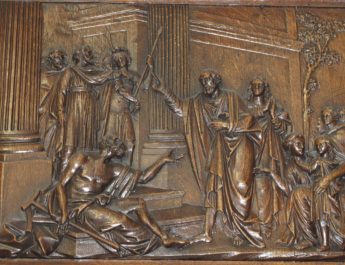Amos 5:18-24
Ordinary A50
18 AlasA for you who desireB the day of the Lord!C
Why do you want the day of the Lord?D
It is darkness,E not light;F
A “alas” = hoy. Perhaps from ho (ah, alas); from hahh (alas, used for grief or woe); from ahahh (alas or ah, used to express pain). This is meant to be onomatopoeia – ah, O, alas, woe. Perhaps where the Yiddish “oy” comes from.
B “desire” = avah. This is to desire, wish for, crave, lust after, to incline.
C “Lord” = YHVH. From havah (to be, become) or hayah (to come to pass, become, be). This is the name of the God of Israel, the self-existent and eternal one, the tetragrammaton. This pronunciation has been lost to time so “Lord” is generally used in its place.
D Literally “for what is this to you the day of the Lord?”
E “darkness” = choshek. From chashak (to be or become dark). This is literal darkness is contrast to light. Figuratively, it can be obscurity, sorrow, misery, blindness, wickedness, destruction, death. It can also be hiding places. Additionally, it can mean judgment, mourning, ignorance, evil, or sin.
F “light” = or. From or (to be or become light). This is light, sun, sunshine, dawn, or daylight. Figuratively, it can refer to light from instruction, light of a face (that is to say one that is cheerful or finds favor). It can refer to prosperity or salvation; a light that guides, a light eternal from Zion.
19 as if someoneG fledH fromI a lion,J
and was metK by a bear;L
G “someone” = ish. Perhaps from enosh (human, humankind, mortal); from anash (to be weak, sick, or frail). This is man, husband, another, or humankind.
H “fled” = nus. This is to flee, vanish away, hide, escape, be displayed.
I “from” = paneh. From panah (to turn, face, appear). This is face in a literal or figurative sense. It could be face, presence, anger, respect. It can also be used of God to indicate divine favor or presence.
J “lion” = ari. From arah (to gather or pluck). This is a young lion.
K “met” = paga. This is to meet or happen, whether unintentionally or of violence. It can also be plead, spare, reach, or intercede.
L “bear” = dob. 12x in OT. From dabab (to glide, flow gently, speak, move slowly). This is a bear, perhaps as a slow moving creature.
or went into the houseM and restedN a handO against the wall,P
and was bittenQ by a snake.R
M “house” = bayit. Probably from banah (to build, make, set up, obtain children; to build literally or figuratively). This is house, court, family, palace, temple.
N “rested” = samak. This is to lean, rest, support, brace, uphold, sustain, or establish. It is to lean on in a positive or negative sense.
O “hand” = yad. This is hand, ability, power. Hand in a literal sense, but also what one can do or the means by which one does it.
P “wall” = qir. Perhaps from qur (to dig, destroy, wall up). This is a wall, ceiling, surface, mason, or town.
Q “bitten” = nashak. 16x in OT. This is bite or sting as from a snake. Figuratively, it is lending with interest.
R “snake” = nachash. Perhaps from nachash (to practice divination, learn by experience; to hiss as in whispering a spell). This is a serpent or snake. Used for the Serpent in the garden of Eden.
20 Is not the day of the Lord darkness, not light,
and gloomS with no brightnessT in it?
21 I hate,U I despiseV your festivals,W
and I take no delightX in your solemn assemblies.Y
S “gloom” = aphel. 1x in OT. From the same as ophel (darkness, gloom, dusk, obscurity) OR from a root which refers to the sun setting. This is gloom i.e. dusky, dark.
T “brightness” = nogah. 19x in OT. From nagah (to shine – root may mean to glitter). This is light, radiance, being bright, sunshine.
U “hate” = sane. This is an enemy or foe. It is one that is hated with a personal hatred.
V “despise” = ma’as. This is to reject, refuse, despise, disdain, reject, or spurn. It can also be to disappear or melt away.
W “festivals” = chag. From chagag (feast, celebrating a festival, making a pilgrimage; properly, going in a circle or marching in sacred procession; implies giddiness and dancing; reeling to and fro). This is a feast, a sacrifice as part of a festival, or the gathering of the festival.
X “take…delight” = ruach. 11x in OT. Related to riach (scent, odor, perceive). This is to blow or breathe. It can imply to perceive, anticipate, or enjoy.
Y “solemn assemblies” = atsarah. 11x in OT. From atsar (to restrain, rule, confine, bond; to hold back, maintain, rule, assemble). This is an assembly, particularly one that was called for a festival or for a holiday.
22 Even though you offerZ me your burnt offeringsAA and grain offerings,BB
I will not acceptCC them;
Z “offer” = alah. This is to go up, approach, ascend, be high, be a priority; to arise in a literal or figurative sense.
AA “burnt offerings” = olah. Related to “offer” in v22. From alah (see note Z above). This is a step, stairs, or some kind of ascent. It is also used for whole burnt offerings, being the offering in which the whole things is burned and rises as smoke. Burnt offerings were the least common of the offerings: most were eaten, shared with the priest and the one bringing the offering.
BB “grain offerings” = minchah. This is a gift or an offering, particularly a sacrificial one that is generally bloodless and given spontaneously (voluntarily).
CC “accept” = ratsah. This is to be pleased with, delight, take pleasure in, or accept with favor. It can mean to approve or consent regarding something. It can also be used specifically of satisfying debts or being pardoned.
and the offerings of well-beingDD of your fattedEE animals
I will not look upon.FF
DD “offerings of well-being” = shelem. From shalem (to make amends, finish, be safe, be friendly, to be complete or sound). This is a peace offering or a sacrifice of well-being. It was a voluntary offering given when one celebrated thanksgiving, alliance, or friendship.
EE “fatted” = meri. 8x in OT. Perhaps from mara (to rebel, flap wings, whip, be filthy). This is a stall-fed cow, a fatling.
FF “look upon” = nabat. This is to behold, look at intently, consider, or scan. It can mean to have respect or regard someone favorably.
23 Take awayGG from me the noiseHH of your songs;
I will not listenII to the melodyJJ of your harps.KK
GG “take away” = sur. This is to turn aside in a literal or figurative sense – to depart, decline, rebel, remove, or withdraw.
HH “noise” = hamon. From hamah (to growl, cry out, be moved, murmur, hum, mourn, rage, clamor). This is a sound, noise, roar, rumbling, wealth, crowd, disquietude.
II “listen” = shama. This is to hear, call, consent, or consider. It implies listening intelligently, giving attention, and, because of these two factors, obedience and action are often implied.
JJ “melody” = zimrah. 4x in OT. From zamar (making music; used specially of music to worship God; music with singing, singing praise, singing psalms); may be from zamar (to trim or prune). This is a melody, psalm, or sound. It is sung to praise God or it might be a song sung with an instrument.
KK “harps” = nebel. From nabel (to fall away, faint, wither, languish, sink; figuratively, being senseless, foolish, or wicked; to despise, disgrace, or fall to nothing, to be seen with contempt). This is a vessel, perhaps made of skins for holding liquids. It could be a skin, vase, or lyre as having a similar shape.
24 But let justiceLL roll downMM like waters,
and righteousnessNN like an ever-flowingOO stream.PP
LL “justice” = mishpat. From shaphat (to judge, defend, pronounce judgment, condemn, govern). This is a verdict or formal sentence whether from humans or from God. It includes the act of judging as well as the place that judging takes place, the suit itself, and the penalty. Abstractly, this is justice, which includes the rights of the participants.
MM “roll down” = galal. 18x in OT. This is to roll, roll away, wallow, commit, remove. It is rolling in a literal or figurative sense.
NN “righteousness” = tsedaqah. From the same as tsedeq (rightness, righteousness, vindication. It is everything that is just or ethical. That which is right in a natural, moral, or legal sense. It also includes just weights (i.e. true weights). Figuratively, this is justice, righteousness, equity – even prosperity). This is righteousness, justice, righteous acts, and moral virtue.
OO “ever-flowing” = ethan. 13x in OT. Root might mean to continue. This is mighty, strong, ever-flowing, enduring, or permanence.
PP “stream” = nachal. From nachal (to take as heritage, inherit, or distribute). This is a river or stream. It could be a wadi or arroyo – sometimes a narrow valley with no water at all, but in strong rains or when winter snow melts, it swells or floods with water.
Image credit: “Nahal Arugot in Israel” by Hanan (Hmbr), 2005.




